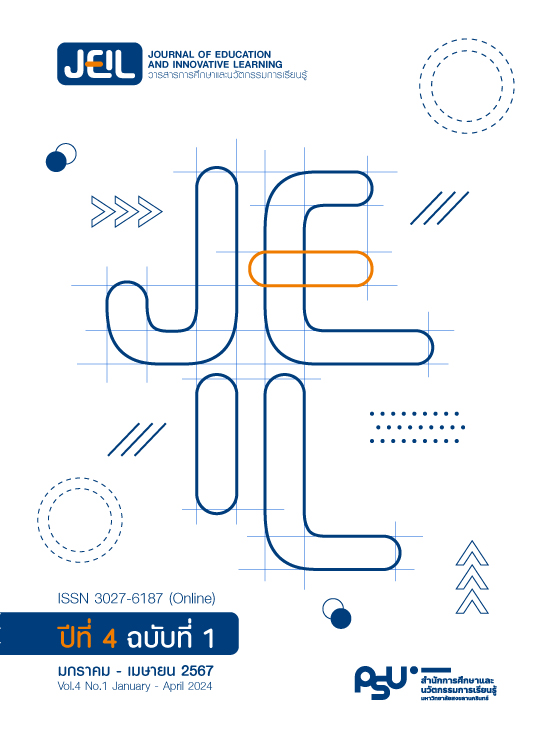บทบาทเทคโนโลยีปัญญาประดิษฐ์ด้านการศึกษาในสถาบันอุดมศึกษา
Main Article Content
บทคัดย่อ
เทคโนโลยีปัญญาประดิษฐ์เป็นการพัฒนาเครื่องจักรหรือระบบคอมพิวเตอร์ให้มีความชาญฉลาด สามารถคิด คำนวณ วิเคราะห์ เรียนรู้และตัดสินใจ โดยใช้เหตุผลได้เสมือนสมองของมนุษย์ การนำเทคโนโลยีปัญญาประดิษฐ์มาประยุกต์ใช้เพื่อพัฒนาด้านการศึกษาในสถาบันอุดมศึกษา ซึ่งถือเป็นองค์กรต้นแบบสำคัญของประเทศในการสร้างและพัฒนาบัณฑิตให้มีความสมบูรณ์ จึงต้องมีการบูรณาการเทคโนโลยีด้านการจัดการศึกษาให้เหมาะสมเพื่อรองรับการบริหารจัดการอุดมศึกษาในยุคดิจิทัล การปรับเปลี่ยนระบบการเรียนรู้ ของผู้เรียนให้หลากหลาย วิเคราะห์รูปแบบพฤติกรรมการเรียนรู้ และสภาพปัญหาต่าง ๆ ของผู้เรียน จะช่วยให้ผู้สอนสามารถปรับเปลี่ยนเนื้อหาสาระและกิจกรรมการเรียนรู้ ให้สอดคล้องกับความสนใจ ความถนัดและความต้องการของผู้เรียนแต่ละคนได้ ตลอดจนช่วยสร้างแรงจูงใจและกระตุ้นการเรียนรู้ให้กับผู้เรียนได้อย่างมีประสิทธิภาพ ซึ่งจะเป็นการช่วยเสริมศักยภาพทางการเรียนให้บรรลุผลสำเร็จ และยกระดับการจัดการศึกษาให้มีคุณภาพได้อย่างยั่งยืนดังนั้น การให้ความสำคัญในการวางแนวนโยบายของการประยุกต์ใช้ปัญญาประดิษฐ์จึงเป็นปัจจัยสำคัญในการขับเคลื่อนยุทธศาสตร์การจัดการศึกษา เร่งยกระดับคุณภาพและการกระจายโอกาสทางการศึกษาของประเทศไทยให้ก้าวสู่สังคมดิจิทัลในโลกยุคใหม่
Article Details

อนุญาตภายใต้เงื่อนไข Creative Commons Attribution-NonCommercial-NoDerivatives 4.0 International License.
เนื้อหาและข้อมูลในบทความที่ตีพิมพ์ในวารสารการศึกษาและนวัตกรรมการเรียนรู้ ถือเป็นข้อคิดเห็นและความรับผิดชอบของผู้เขียน ซึ่งกองบรรณาธิการวารสาร ไม่จำเป็นต้องเห็นด้วยหรือร่วมรับผิดชอบใด ๆ และไม่สงวนสิทธิ์การคัดลอกบทความเพื่อใช้ประโยชน์ทางวิชาการ แต่ให้อ้างอิงข้อมูลแสดงที่มาของบทความทุกครั้งที่นำไปใช้ประโยชน์
เอกสารอ้างอิง
Agrawal, A., Gans, J. S., & Goldfarb, A. (2019). Artificial intelligence: The ambiguous labor market impact of automating prediction. Journal of Economic Perspectives, 33(2), 31-50. doi:10.1257/jep.33.2.31
Alqahtani, F., & Ramzan, N. (2019). Comparison and efficacy of synergistic intelligent tutoring systems with human physiological response. Sensors, 19(3), 460. doi:10.3390/s19030460
Anada. (2023). Get to know ChatGPT & DALL·E. Retrieved from https://www.ananda.co.th/blog/thegenc/ทำความรู้จัก-chatgpt-dall·e-2/ [in Thai]
Brynjolfsson, E., Hui, X., & Liu, M. (2019). Does machine translation affect International trade? evidence from a large digital platform. Management Science, 65(12), 5449-5460. doi:10.1287/mnsc.2019.3388
Cope, B., Kalantzis, M., & Searsmith, D. (2021). Artificial intelligence for education: Knowledge and its assessment in AI-enabled learning ecologies. Educational Philosophy and Theory, 53(12), 1229-1245. doi:10.1080/00131857.2020.1728732
Crockett, K., Latham, A., & Whitton, N. (2017). On predicting learning styles in conversational intelligent tutoring systems using fuzzy decision trees. International Journal of Human-Computer Studies, 97, 98-115. doi:10.1016/j.ijhcs.2016.08.005
Depa. (2023). Tech series: Artificial intelligence (AI). Retrieved from https://www.depa.or.th/en/article-view/tech-series-artificial-intelligence-ai [in Thai]
Emran, M. A., & Shaalan, K. (2014, September 24-27). A survey of intelligent language tutoring systems. In Proceedings of the 2014 International Conference on Advances in Computing, Communications and Informatics (ICACCI) (393-399). Delhi, India: IEEE. doi:10.1109/ICACCI.2014.6968503
Felder, R. M., & Silverman, L. K. (1988). Learning and teaching styles in engineering education. Engineering education, 78(7), 674-681.
Hayath, Z. (2018). 3 Reasons why artificial intelligence can revolutionize education. Retrieved from https://www.entrepreneur.com/article/323470
Hosny, A., Parmar, C., Quackenbush, J., Schwartz, L. H., & Aerts, H. J. (2018). Artificial intelligence in radiology. Nature Reviews Cancer, 18(8), 500-510. doi:10.1038/s41568-018-0016-5
Jackson, P. C. (2019). Introduction to artificial intelligence (3rd ed.). New York: Dover.
Jiménez, S., Juárez-Ramírez, R., Navarro, R., Coronel, A., & Castillo, V. H. (2016, April 27-29). Architecting an intelligent tutoring system with an affective dialogue module. In Proceedings of the 2016 4th International Conference in Software Engineering Research and Innovation (CONISOFT) 122-129. Puebla, Mexico: IEEE. doi:10.1109/CONISOFT37771.2016
Kelly, D., & Tangney, B. (2002). Incorporating Learning Characteristics into an Intelligent Tutor. In S. A., Cerri, G. Gouardères, & F. Paraguaçu (Eds.), Intelligent Tutoring Systems (729-738). Springer, Berlin, Heidelberg. doi:10.1007/3-540-47987-2_73
Koulu, R. (2020). Human control over automation: EU policy and AI ethics. European Journal of Legal Studies, 12(1), 9-46. doi:10.2924/EJLS.2019.019
Khumpiranon, S. (2019). Artificial intelligence in Thailand. Retrieved from https://www.senate.go.th/assets/portals/1/news/6304/2_เล่มเต็มบทความ00100864.pdf [in Thai]
Latham, A., Crockett, K., & McLean, D. (2014). An adaptation algorithm for an intelligent natural language tutoring system. Computers & Education, 71, 97-110. doi:10.1016/j.compedu.2013.09.014
Lu, Y., Pian, Y., Chen, P., Meng, Q., & Cao, Y. (2021, February 2-9). RadarMath: An intelligent tutoring system for math education. In Proceedings of the AAAI Conference on Artificial Intelligence, 35(18), 16087-16090. doi:10.1609/aaai.v35i18.18020
Lynchmay, M. (2018). 7 Roles for artificial intelligence in education. Retrieved from https://www.thetechedvocate.org/7-roles-for-artificial-intelligence-in-education/
NECTEC. (2022). The government is advancing the national artificial intelligence strategic action plan, fostering people, technology, social growth, and economic development through AI. Retrieved from https://ai.in.th/news/national-ai-committee/ [in Thai]
Mahmoud, M. H., & El-Hamayed, S. H. A. (2016). An intelligent tutoring system for teaching the grammar of the Arabic language. Journal of Electrical Systems and Information Technology, 3(2), 282-294. doi:10.1016/j.jesit.2016.04.001
Mano, P. (2019). The impact of digital disruption to the education. Journal of Industrial Education, 18(1), 1-6. [in Thai]
Martinez, R. (2019). Artificial intelligence: Distinguishing between types & definitions. Nevada Law Journal, 19(3), 1015-1042.
Mittelstadt, B. (2019). Principles alone cannot guarantee ethical AI. Nature Machine Intelligence, 1(11), 501-507. doi:10.1038/s42256-019-0114-4
Monett, D., Lewis, C. W., Thórisson, K. R., Bach, J., Baldassarre, G., Granato, G., ... & Winfield, A. (2020). Special issue “On defining artificial intelligence”—Commentaries and Author’s Response. Journal of Artificial General Intelligence, 11(2), 1-100. doi:10.2478/jagi-2020-0003
Muangprathub, J., Boonjing, V., & Chamnongthai, K. (2020). Learning recommendation with formal concept analysis for intelligent tutoring system. Heliyon, 6(10), e05227. doi:10.1016/j.heliyon.2020.e05227
Papanikolaou, K. A., Grigoriadou, M., Kornilakis, H., & Magoulas, G. D. (2002). INSPIRE: An intelligent system for personalized instruction in a remote environment. In S. Reich, M. M. Tzagarakis, & P. M. E. De Bra (Eds.), Hypermedia: Openness, Structural Awareness, and Adaptivity (215-225). Springer Berlin Heidelberg. doi:10.1007/3-540-45844-1_21
Paschen, J., Kietzmann, J., & Kietzmann, T. C. (2019). Artificial intelligence (AI) and its implications for market knowledge in B2B marketing. Journal of Business & Industrial Marketing, 34(7), 1410-1419. doi:10.1108/JBIM-10-2018-0295
Pumpachart, T., Santhuenkaew, T., Makul, S., Bunlertpornpisut, R., & Sommaneedoung, S. (2020). The concept of Thai educational in the 5th generation. EAU Heritage Journal Social Science and Humanities, 10(3), 31-38. [in Thai]
Sani, S., & Aris, T. N. (2014, January 27-29). Computational intelligence approaches for student/tutor modelling: A review. In Proceedings of the 2014 5th International Conference on Intelligent Systems, Modelling and Simulation (72-76). Langkawi, Malaysia: IEEE doi:10.1109/ISMS.2014.21
Secretariat Office of the Teachers’ Council of Thailand. (2023). The professional education hub: Smart educators. Retrieved from https://www.ksp.or.th/2023/12/04/47748/ [in Thai]
Stanford University. (2022). Measuring trends in artificial intelligence. Retrieved from https://aiindex.stanford.edu/ai-index-report-2022/
Yasaka, K., & Abe, O. (2018). Deep learning and artificial intelligence in radiology: Current applications and future directions. PLOS Medicine, 15(11), e1002707. doi:10.1371/journal.pmed.1002707


